AVG vs Kaspersky: Full Side-By-Side Antivirus Review (2024)
AVG has previously received criticism for selling user data, and multiple government agencies have advised against using Kaspersky due to privacy concerns. However, both apps are redeeming themselves. AVG is now under new leadership, while Kaspersky has set up a Global Transparency Initiative. With this in mind, I wanted to compare them against each other to see which antivirus is technically superior.
Through extensive testing, I learned that both antiviruses are equally effective at removing malware from your system. However, Kaspersky is better than AVG, as it’s lighter, has better customer support, includes a privacy-focused VPN, and provides more value for money.
So, between both choices, Kaspersky is better for overall device security. Plus, you can try Kaspersky risk-free as it’s backed by a 30-day money-back guarantee.
Try Kaspersky risk-free for 30 days
No Time? Here’s a 1-Minute Summary of Category Winners
I thoroughly tested both antiviruses and found that Kaspersky is better in various categories. While AVG is just as good at detecting and removing malware, Kaspersky stands out with its privacy-focused VPN, better feature variety, and responsive customer support.
 |
 |
|
| Virus Scanner | Finds and removes 100% of malware via scans | Detects and removes 100% of malware through its various virus scans |
| Real-Time Malware Protection | 100% detection rate against real-time threats | Blocks 100% of zero-day malware and real-time threats |
| System Performance | Slows down device performance slightly | Doesn’t cause any noticeable performance slowdowns |
| VPN | Has a built-in VPN, but it logs some details | Provides a secure VPN with a no-logging policy |
| Parental Controls | Doesn’t have parental controls | Offers the useful Kaspersky Safe Kids parental control suite |
| Firewall | Secure and easily customizable firewall | Reliable firewall, but it’s not as easy to customize |
| Password Manager | Doesn’t have a password manager | Provides a built-in password manager to safeguard credentials |
| Gaming Mode | Do Not Disturb mode to silence notifications | Offers gaming and Do Not Disturb modes that both silence notifications |
| Optimization Tools | Has a performance scan to optimize system performance | Includes multiple effective tools to enhance system performance |
| Other Features | Various additional features, including its Network Scanner, Sensitive Data Shield, Fake Website Shield, and more | Several extra features, such as the File shredder, Safe Money, Data Leak Checker, and more |
| Device Compatibility | Protects Windows, macOS, iOS, and Android devices | Secures Windows, macOS, iOS, and Android devices |
| Customer Service | Offers 24/7 live chat, community forums, and an online knowledge base | Includes 24/7 live chat, phone support, email support, and an online knowledge base |
| Price | Has multiple paid plans but doesn’t deliver the best value for money | Offers various well-priced plans that provide excellent value |
| Free Trial | Provides a 30-day free trial for its Internet Security plan and doesn’t require a credit card | Has a 30-day free trial for every plan but requires a credit card |
| Money-Back Guarantee | 30-day money-back guarantee | 30-day money-back guarantee |
Secure your system with Kaspersky
How I Tested and Compared AVG vs Kaspersky
I tested both these apps across the following categories to determine the better overall antivirus:
- Virus Scanner — I checked both apps’ virus scanners to learn which antivirus finds and removes more malware.
- Real-Time Malware Protection — I tested each app’s real-time security to see how effective their protection is against real-time threats and zero-day malware.
- System Performance — I checked which antivirus is lighter and consumes fewer system resources.
- VPN — I compared the VPNs in both apps to see which offers better performance.
- Parental Controls — I checked if these antiviruses offer parental controls and which app has better features for safeguarding children.
- Firewall — I looked at the firewall in both antiviruses to see which one is more customizable and offers better security.
- Password Manager — I examined whether these apps have password managers capable of protecting passwords and other sensitive information.
- Gaming Mode — I checked if these antiviruses come with gaming modes and whether these modes improve performance.
- Optimization Tools — I compared the optimization tools in both antiviruses to determine the better app for improving system performance.
- Other Features — I looked at which app offers a wider variety of additional features for extra protection.
- Device Compatibility — I checked which antivirus protects more platforms.
- Customer Service — I contacted each app’s customer support through all available methods to learn which antivirus offers better support.
- Price — I compared both apps’ price plans to determine which one offers better value for money.
- Free Trial — I checked which antivirus has a better free trial.
- Money-Back Guarantee — I examined whether these apps come with money-back guarantees and how easy it is to get a refund.
Protect your devices with Kaspersky
1. Virus Scanner — Both Antiviruses Provide Effective Virus Scanners
I first tested both apps’ virus scanners to see which is better at detecting and eliminating malware from your system. In my tests, AVG and Kaspersky successfully found and removed every malicious file I hid across my system. However, you should know that they highlighted a few safe files as malicious, meaning their security isn’t flawless.
Both apps offer multiple scans, including the following:
| AVG | Kaspersky |
| Smart Scan | Quick Scan |
| Deep Scan (Full Scan) | Full Scan |
| File or Folder Scan (Custom Scan) | Selective Scan (Custom Scan) |
| Boot-Time Scan | Instant File Scan |
| USB/DVD Scan | Removable Drive Scan |
| Performance Scan | Background Scan |
| – | Application Vulnerability Scan |
While neither app offers the quickest virus scans, I was pleased to see that they have reasonably fast scan speeds. AVG’s Deep Scan took around an hour to scan my whole system, while Kaspersky’s Full Scan took roughly 45 minutes in my tests.
Besides my tests, I reviewed data from AV-TEST, an independent third party that thoroughly evaluates various security apps’ performance. I learned that AV-TEST’s data corroborated my findings and showed that AVG and Kaspersky find 100% of malware via their scans.
Overall, it is a tie here as both antiviruses provide effective virus scans that reliably find all malware. However, you should note that neither antivirus has flawless results because they highlight some false positives. If you want industry-leading malware detection, I suggest you get Norton to remove viruses, as it detects 100% of malware without highlighting any false positives.
Virus Scanner Winner: Tie
2. Real-Time Malware Protection — You’ll Get Reliable Real-Time Security With either Security App
A security app’s real-time protection determines how effectively it secures you against real-time threats and zero-day malware. I tested these apps by trying to download malware samples and opening unsafe websites, and they both delivered impressive results. In my tests, AVG and Kaspersky had a 100% detection rate against all real-time threats and zero-day malware.
I was pleased to see how many tools both apps provide to protect you against threats in real-time. Kaspersky provides web, ransomware, and mail protection to improve overall security. With AVG, you’ll get a Web Shield, Email Shield, and Ransomware Shield. Plus, AVG has a unique Behavior Shield that constantly monitors the behavior of active processes to detect malicious activity.
Since both apps provide excellent real-time protection, it’s a tie in this category.
Real-Time Malware Protection Winner: Tie
3. System Performance — AVG Consumes More Resources and Causes Minor Slowdowns
After thoroughly testing both apps, I learned that Kaspersky is the lighter antivirus and doesn’t slow down system performance as much as AVG. I enabled real-time protection features on both antiviruses and let them idle in the background while doing various tasks to test their impact on performance.
The following table shows the slowdowns I experienced when testing AVG and Kaspersky:
| AVG | Kaspersky | |
| Slowdown when opening websites | 30% | 27% |
| Slowdown when copying files locally | 12% | 7% |
| Slowdown when launching applications | 1% | 1% |
| Average slowdown | 14.3% | 11.6% |
While neither app affects speed when launching applications, AVG caused a noticeable drop in performance while copying files and opening websites. Furthermore, I analyzed the resources these apps consumed while idle and during full scans and listed them below:
| Idle CPU Usage (Average) |
Idle Memory Usage (Average) |
Idle Disk Usage (Average) |
Full Scan CPU Usage (Max) | Full Scan Memory Usage (Max) |
Full Scan Disk Usage (Max) |
|
| AVG | 2% | 166MB | 1MB/s | 34% | 381MB | 237MB/s |
| Kaspersky | 3% | 110MB | 1MB/s | 36% | 412MB | 157MB/s |
AVG uses more memory when idle, while Kaspersky consumes more during its full scan. CPU usage is roughly the same for both apps, but AVG’s disk usage is much higher during full scans, thus causing slowdowns.
Overall, Kaspersky wins here because it was the lighter antivirus throughout my tests.
System Performance Winner: Kaspersky
Protect your computer with Kaspersky
4. VPN — Kaspersky’s VPN Is Better for Privacy
VPNs help improve overall security by encrypting your connection and keeping you anonymous online. Kaspersky and AVG offer VPNs with industry-standard AES 256-bit encryption, but I consider Kaspersky’s VPN better because of its privacy-focused approach.
Kaspersky’s VPN has a strict no-logs policy, meaning it doesn’t store any data about your activity. However, AVG logs some information like time stamps of your connections, bandwidth usage, and the IP addresses of servers you connect to.
My team and I also tested both VPNs’ streaming performance and found that Kaspersky is much better for streaming. Kaspersky’s VPN lets you access Netflix, HBO Max, Disney+, Hulu, Amazon Prime Video, and BBC iPlayer. On the other hand, AVG’s VPN only lets you access Netflix, BBC iPlayer, and HBO Max.
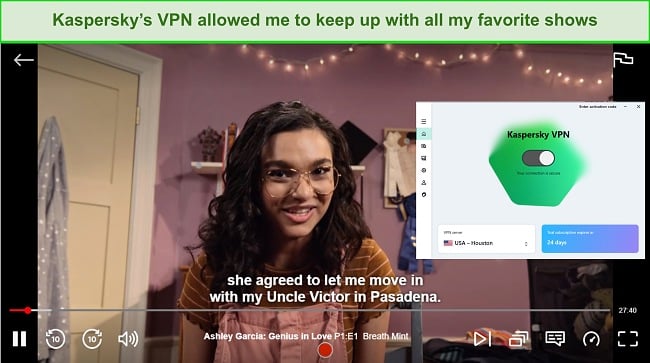
Kaspersky’s VPN provides servers in 70+ countries, while AVG’s VPN covers under 40 countries. As for speeds, I experienced a maximum drop of 35% when testing various AVG and Kaspersky servers. So, both VPNs provide similarly fast connection speeds capable of lag-free UHD streaming.
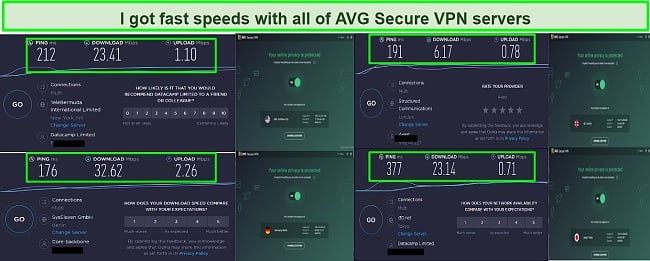
Both VPNs provide a built-in kill switch, meaning they’ll keep you safe and anonymous if your connection ever drops. Overall, Kaspersky wins because its VPN is more privacy-focused and is better for streaming.
VPN Winner: Kaspersky
Surf the web safely with Kaspersky
5. Parental Controls — Kaspersky’s Safe Kids Parental Controls Are Excellent for Safeguarding Children
You can use parental controls to manage your kids’ online activity and keep them safe. There aren’t any parental controls in AVG, but Kaspersky has one of the best parental control suites I’ve used in an antivirus. It comes with multiple tools that you can use to monitor your kids’ activity, track their location, and keep them safe from cyber threats and other dangers.
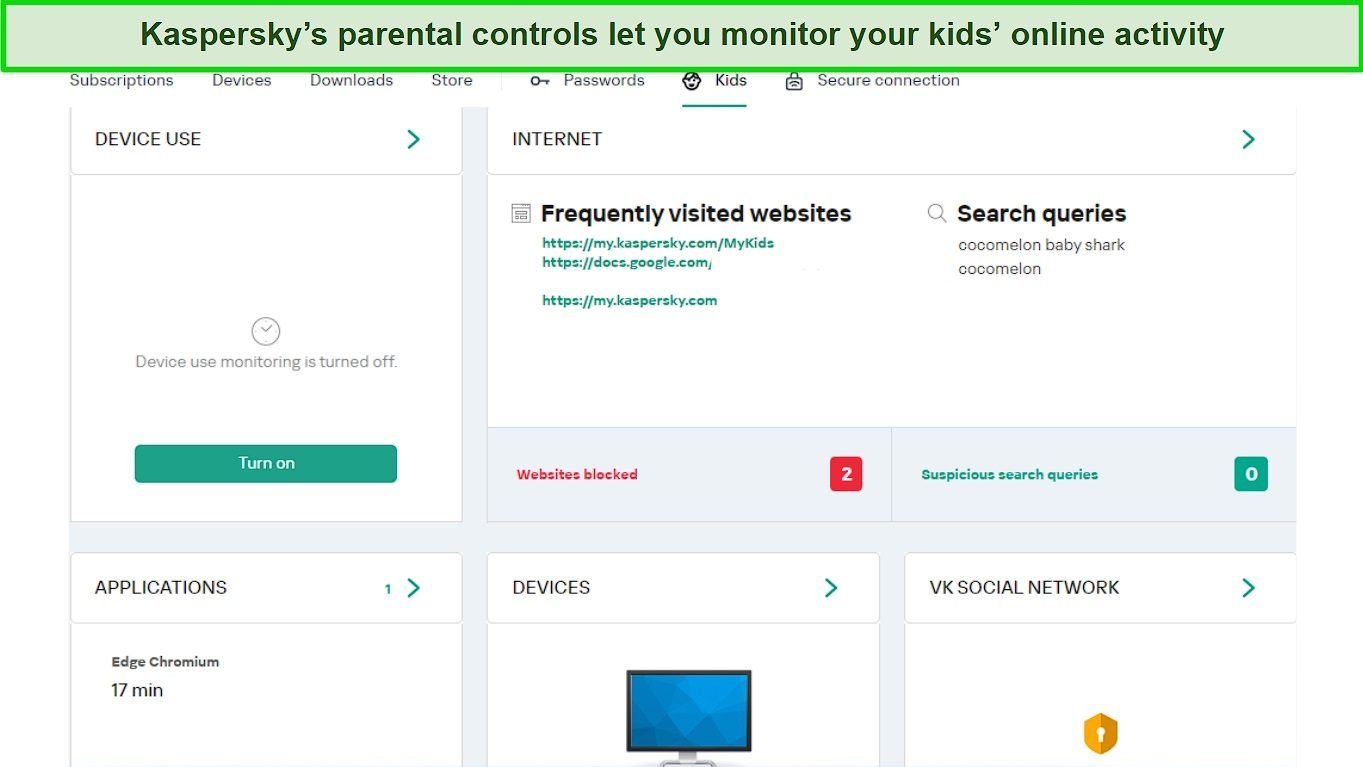
Kaspersky’s parental controls let you track and manage your kids’ online activity, filter inappropriate sites, and block specific apps. Also, you can set how much screen time they’re allowed in a day and get alerts whenever your child’s device is low on battery.
Besides the above features, Kaspersky offers effective GPS tracking so you know where your children are at all times. Also, the geofencing tool informs you if your kid exits a specified area.
Since AVG doesn’t have parental controls and Kaspersky’s Safe Family controls are so effective, the winner is obvious here.
Parental Controls Winner: Kaspersky
Secure your children with Kaspersky
6. Firewall — Both Apps Have Customizable Firewalls but AVG’s Is More Intuitive
Firewalls are your system’s first line of defense against online cyber threats. Although both these antiviruses provide a secure firewall, AVG’s firewall stands out because it’s easier to customize and has multiple advanced features. It has an intuitive interface that easily lets you access and customize rules for apps and networks. Plus, it lets you view logs that show all the connections and devices it’s blocked.
The unique features of AVG’s firewall include its Leak Protection, Port Scan Alerts, and ARP Spoofing Alerts. These keep your data from leaking on networks, warn you if someone scans your system for open ports, and alert you about spoofing attempts.
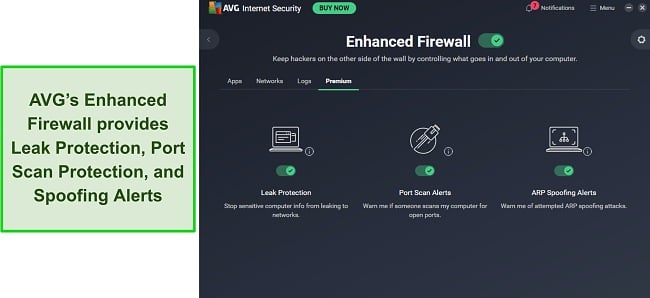
Kaspersky’s firewall also provides reliable security, but it’s harder to customize. You can adjust its configuration and change application and packet rules via its settings. However, AVG’s firewall has a more intuitive interface that lets you make these changes in a few clicks.
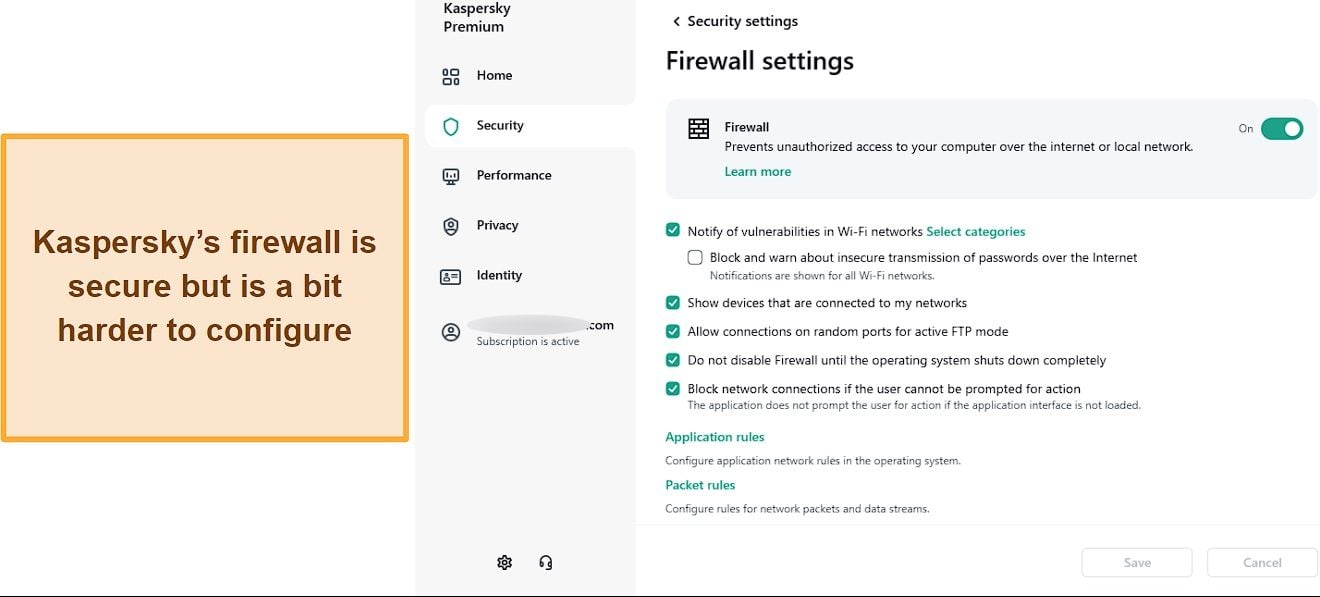
While both apps have effective firewalls, I consider AVG the winner here because its firewall is more intuitive and offers more features.
Firewall Winner: AVG
7. Password Manager — Kaspersky Includes an Effective Password Manager While AVG Doesn’t Have One
A password manager is a helpful tool to help secure passwords, credit cards, and other sensitive information. You won’t get a password manager with AVG, but Kaspersky has an effective password manager to safeguard passwords, notes, credit cards, and more. Also, its password manager uses AES 256-bit encryption, thus making it perfect for securing sensitive information.
Besides its airtight security, Kaspersky’s password manager provides the following features to make password management easy:
- Password Check — checks if you have any weak, duplicate, or compromised passwords.
- Autofill — automatically fills forms on websites to save time.
- Auto-save — instantly lets you save any login information you use on websites.
- Password Generator — generates secure passwords for your accounts.
I found the password generator especially useful because it lets you customize what your passwords should be like. You can set password length, whether they should have digits and special characters, and if they should include uppercase letters.
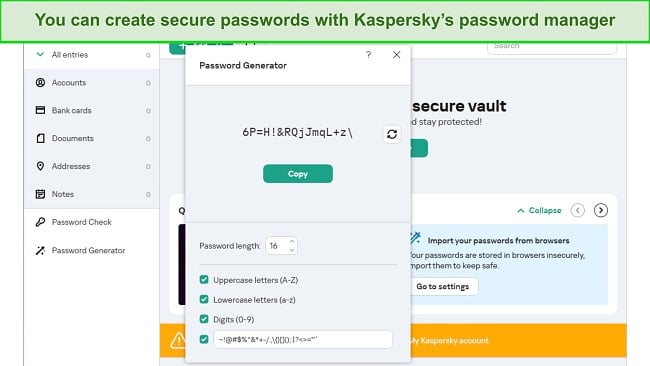
Overall, Kaspersky’s password manager is very impressive, and AVG doesn’t have one, so we have a clear winner here.
Password Manager Winner: Kaspersky
Protect your passwords with Kaspersky
8. Gaming Mode — Neither App Improves Gaming Performance
Many top security apps have modes designed to help gaming performance while enabled. However, while AVG and Kaspersky come with Do Not Disturb modes, neither antivirus noticeably improves gaming performance.
AVG’s Do Not Disturb mode silenced notifications from all apps and suspended background tasks like virus scans and Windows updates in my tests. However, I got the same frame rates (FPS) I always do when playing League of Legends and Counter-Strike: Global Offensive, meaning there isn’t any real performance benefit for games.
On the other hand, Kaspersky offers gaming and Do Not Disturb modes, but they have the same effect. While they silenced notifications, I tried playing the same games and noticed no performance benefits.
Since neither AVG nor Kaspersky offers noticeable benefits in this category, I suggest you use Norton to enhance gaming performance. It has gaming-focused plans containing its Game Optimizer, which noticeably improves frame rates and smoothness while gaming.
Gaming Mode Winner: Tie
9. Optimization Tools — Kaspersky’s Optimization Tools Are Better for Improving Performance
Optimization tools are a handy add-on in high-end security apps because they help you make the most of your system. Although both these antiviruses have ways to improve device performance, Kaspersky has more tools to make your system run as fast as possible. I found that it has multiple tools that you can use for optimization, including the following:
- Quick Startup — helps disable unnecessary programs at boot to improve startup speed.
- PC Speed-Up — removes junk files and registry issues to free up space and improve performance.
- Duplicate File Finder — finds and removes duplicate files from your system.
- Privacy Cleaner — removes cookies and other trackers that can monitor your online activity.
- Battery Saver — helps improve battery life on laptops.
- Hard Drive Health Monitor — monitors your hard drive health and informs you if it reaches low levels.
All of Kaspersky’s optimization features are helpful, and I especially like the PC Speed-Up tool. It quickly scanned my system and found various junk files and registry issues I could remove.
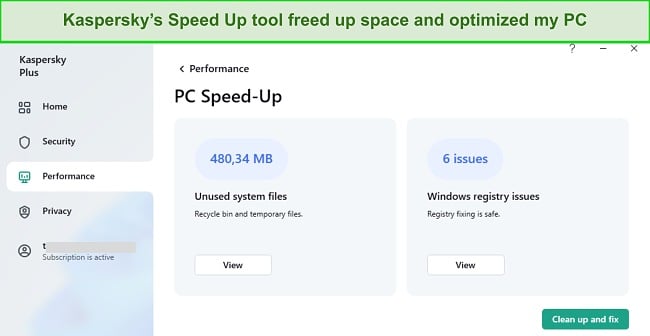
The only optimization tool in AVG is its Performance Scan, but it finds various improvements to make. It helped me free up over 9GB of space, found several registry issues, and highlighted other fixes to improve my system. It’s a good tool, but unfortunately, you can only optimize performance with AVG using its most premium plan, while Kaspersky’s optimization tools are available on all its plans.
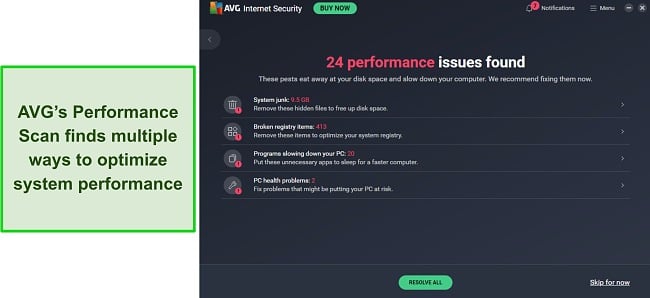
Since Kaspersky’s multiple optimization tools are more effective, and you can only use AVG’s optimization features on its most premium plan, Kaspersky wins here.
Optimization Tools Winner: Kaspersky
Improve device performance with Kaspersky
10. Other Features — Both AVG and Kaspersky Have Several Extra Security Features
Both AVG and Kaspersky provide multiple tools to add extra layers of security and safeguard your devices against cyber threats. You’ll get the following features with AVG:
- Network Inspector — scans your network to check for vulnerabilities.
- Webcam Protection — blocks unauthorized access to your webcam.
- Fake Website Shield — secures you against fake websites that could have phishing scams.
- AVG AntiTrack — removes trackers, cookies, and other files that could track your online activity (Ultimate plan only).
- Hack Alerts — informs you if your accounts are compromised in data breaches.
All of AVG’s extra features provide added security, and its Network Inspector is especially useful. I often used it to check if my network is secure and found that it also lets you scan the devices on your network for vulnerabilities.
On the other hand, Kaspersky’s extra features include the following:
- Webcam and Microphone Protection — blocks unauthorized access to your system’s webcam and microphone.
- Safe Money — provides a secure environment for online banking and shopping.
- Cloud Storage — lets you upload sensitive files onto your preferred cloud storage platform.
- File Shredder — permanently deletes sensitive files you don’t want anyone else to access.
- Data Leak Checker — checks if any of your logins were leaked in data breaches.
Each of Kaspersky’s additional features helps improve overall security against cyber threats. Of all its tools, I most frequently used Safe Money because it let me open banking websites with complete peace of mind.
All things considered, it’s a tie here because both antiviruses have various features to improve device security.
Other Features Winner: Tie
11. Device Compatibility — You Can Use either Antivirus to Protect All Major Platforms
You can secure all major platforms, including Windows, macOS, iOS, and Android, with both AVG and Kaspersky. Both antiviruses provide native apps for all these platforms, which are easy to install and use.
When testing AVG, I found its desktop app easy to set up. Download the setup, follow its steps, and it’ll run on your system within minutes. Its mobile apps are also simple to install because you can get them via your device’s app store, which only takes a minute. Also, all of AVG’s apps have intuitive designs, thus making them easy to navigate and use.
While the desktop apps for Windows and macOS are nearly identical, AVG’s Android app is much more feature-rich than its iOS counterpart, as it offers:
- Built-in VPN
- Virus scans
- Real-time protection
- WiFi scanning
- Phishing protection
- Vulnerability scans
- ID protection
- Optimization tools
- Photo vault
On the other hand, AVG’s iOS app only offers a built-in VPN, WiFi scanning, ID protection, and a photo vault.
Installing and using Kaspersky is just as easy. Its desktop setup has only a few steps that let you easily install the app within minutes. The same goes for its mobile apps, which you can almost instantly get via the Apple or Android app stores. Kaspersky’s mobile and desktop apps are both easy to use, so even beginners can secure their devices with this antivirus.
You’ll get similar layouts and features in Kaspersky’s desktop apps. However, Kaspersky’s Android app has more features than the iOS variant. The Android app has virus scans, real-time security, a QR scanner, a data leak checker, anti-phishing, web protection, SMS protection, a password manager, a built-in VPN, and a WiFi monitor. The iOS app includes most of these features and jailbreak detection, but it doesn’t have virus scans and real-time protection.
Both antiviruses protect every major platform and are easy to use, so I’m calling it a tie in this category.
Device Compatibility Winner: Tie
12. Customer Service — It’s Easier to Get Help Through Kaspersky’s Customer Support
AVG and Kaspersky have multiple customer support channels to help you if you ever face issues, but Kaspersky’s support is a lot more helpful and responsive. It provides 24/7 live chat, phone support, email support, and an online knowledge base. Of all Kaspersky’s support channels, I consider its live chat the best because I quickly connected with an agent whenever I used it.
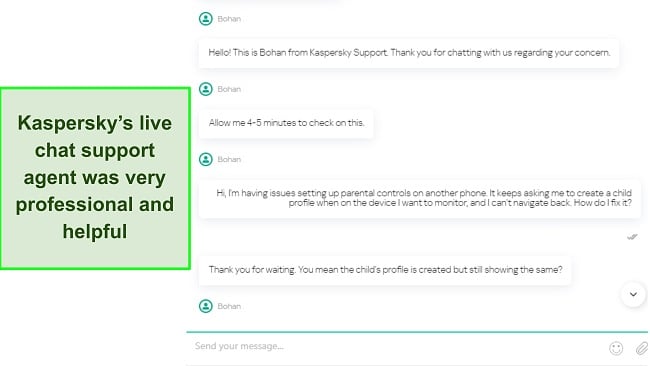
Kaspersky’s email and phone support is also great. I got responses to my emails in under 24 hours, and it took roughly 5 minutes to connect to a representative via phone support. Plus, the knowledge base has useful information to help fix various issues.
On the other hand, AVG provides live chat, community forums, and an online knowledge base. Unfortunately, its live chat isn’t as reliable as Kaspersky’s because its agents are pushy and constantly try to upsell you. I eventually got the help I needed but was annoyed by the multiple upsell attempts.
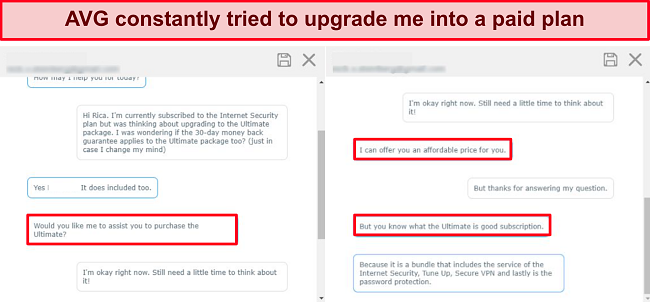
AVG doesn’t have phone or email support like Kaspersky. However, there’s a community forum where you can get help from experts. Also, the extensive knowledge base has lots of helpful information about the antivirus.
Overall, Kaspersky’s customer support is far superior to AVG’s because it offers more support channels and better live chat.
Customer Service Winner: Kaspersky
Safeguard your system with Kaspersky
13. Price — Kaspersky’s Plans Offer Much Better Value for Money
Between both antiviruses, Kaspersky offers much better value for money. Its plans are well-priced, starting at just $27.99/year, and include the following:
- Kaspersky Standard — has Kaspersky’s core antivirus features, Safe Money payment protection, and optimization tools.
- Kaspersky Plus — provides Kaspersky’s VPN and Data Leak Checker along with the features in Standard.
- Kaspersky Premium — offers Kaspersky’s ID protection, expert virus check, parental controls, and all the above features.
Of the available options, Kaspersky Plus offers the best value. It includes Kaspersky’s core security features and a built-in VPN that you can use to stay safe online. Also, Kaspersky’s plans are available as 1-year or 2-year subscriptions, and I suggest getting its 1-year plan if you want the best value.
AVG offers 2 plans, but neither provides the value you get from any of Kaspersky’s plans. Its plans include the following:
- AVG Internet Security — has AVG’s core antivirus, wifi security, phishing protection, and other vital security features.
- AVG Ultimate — includes AVG’s optimization tools, VPN, AntiTrack feature, and everything in Internet Security.
I consider AVG’s Internet Security plan a better value proposition. While Ultimate has useful optimization features and a built-in VPN, I don’t consider these features worthwhile because of the price difference. You should note that you can choose how many devices you want to protect when buying AVG or Kaspersky’s plans, and the prices change accordingly.
Both antiviruses have multiple plans you can choose from, but Kaspersky’s plans offer more value for money, thus making it this category’s winner.
Price Winner: Kaspersky
Protect your devices with Kaspersky
14. Free Trial — Both Apps Provide 30-Day-Long Free Trials
I was pleased to see that both AVG and Kaspersky offer free trials. So, you can try either app’s premium features risk-free for 30 days to see if they meet your needs.
Something that helps Kaspersky stand out in this category is that it lets you select any of its plans for a free trial. However, AVG only gives you access to the Internet Security plan. So, if you want to try AVG’s VPN and optimization tools, you need its Ultimate plan.
However, you should note that Kaspersky’s free trial requires you to sign up with a credit card, while AVG doesn’t require one.
Both antiviruses offer free trials with different strengths and weaknesses, thus making it a tie in this category.
Free Version Winner: Tie
15. Money-Back Guarantee — You’ll Get a Money-Back Guarantee With Both Antiviruses
A money-back guarantee lets you try an antivirus completely risk-free before fully committing to your purchase. Thankfully, you’ll get a money-back guarantee with both Kaspersky and AVG. Kaspersky’s money-back guarantee is 30 days long, and the same goes for AVG, meaning you will get plenty of time to test either antivirus.
I tested AVG’s money-back guarantee by submitting the refund request form on its website. However, I didn’t receive a response that way. So, I asked for a refund via its 24/7 live chat, which the agent processed immediately. Afterward, AVG refunded my money in just 2 days.
For Kaspersky, I submitted a refund request via a form on its website and got a response within a few hours. It took Kaspersky 7 working days to refund my money.
Overall, since both apps have equally long money-back guarantees that are easy to claim, they’re tied in this category. However, if you want an even longer money-back guarantee, you can try Norton completely risk-free for up to 60 days.
Money-Back Guarantee Winner: Tie
And the Winner Is… Kaspersky
After thorough tests, Kaspersky won in 7 categories, AVG won in 1, and both apps tied in the remaining 7 categories. So, while both antiviruses have their strengths, Kaspersky is the better option.
- Virus Scanner — Tie
- Real-Time Malware Protection — Tie
- System Performance — Kaspersky
- VPN — Kaspersky
- Parental Controls — Kaspersky
- Firewall — AVG
- Password Manager — Kaspersky
- Gaming Mode — Tie
- Optimization Tools — Kaspersky
- Other Features — Tie
- Device Compatibility — Tie
- Customer Service — Kaspersky
- Price — Kaspersky
- Free Trial — Tie
- Money-Back Guarantee — Tie
In conclusion, Kaspersky stands out as the better antivirus for most scenarios. It offers a better VPN, reliable parental controls, affordable pricing, and reliable customer support that you can contact at any time. Best of all, you can try Kaspersky risk-free for 30 days, thanks to its money-back guarantee.
However, you should note that AVG has its strengths as well. For instance, AVG is worthwhile if you want an antivirus with a secure firewall or an app that provides a free trial without needing a credit card. Also, you can try AVG risk-free for 30 days even after buying it, thanks to its 30-day money-back guarantee.
Neither of these apps is flawless, though. Kaspersky’s firewall is hard to customize, and AVG has unreliable customer support. Instead, I suggest you get Norton because it offers industry-leading malware detection, multiple advanced security features, great parental controls, a rock-solid VPN, and excellent customer support. Of course, it also has a 60-day money-back guarantee, meaning you can try Norton completely risk-free.
Overall Winner: Kaspersky
Safeguard your devices with Kaspersky
How to Use Kaspersky’s Free Trial on Your Device
In the following steps, I’ll explain how to subscribe to Kaspersky’s free trial and try all its premium features risk-free for 30 days. I’ve chosen Kaspersky’s Windows antivirus because it’s the most popular platform, but you can just as easily install it on macOS, iOS, or Android devices.
- Open Kaspersky’s free trials — Navigate to Kaspersky’s Downloads page and click on Explore Free Trials to see a list of available trials.
![Screenshot of Kaspersky's Downloads page]()
- Choose a plan that suits you — Click the Download Free Trial button under whichever Kaspersky plan you want to try.
![Screenshots of the various free trials Kaspersky offers]()
- Enter your details and subscribe to the trial — Enter your personal and payment details to subscribe to Kaspersky’s free trial.
![Screenshot showing how to subscribe to Kaspersky's free trial]()
- Download Kaspersky’s setup — Access Kaspersky’s web portal and download the setup for Windows.
![Screenshot showing how to download Kaspersky's Windows setup]()
- Install Kaspersky — Run the setup to install Kaspersky on your system.
![Screenshot showing Kaspersky's Windows setup in progress]()
- Secure your system with Kaspersky — Try Kaspersky’s virus scans, real-time security, firewall, and other features risk-free.
![creenshot of Kaspersky's Windows app after installation]()
Try Kaspersky risk-free for 30 days
FAQs About AVG vs Kaspersky
Is Kaspersky better than AVG?
Yes, Kaspersky stood out as the superior antivirus in my tests. It offers better customer support, a privacy-focused VPN, and more features for optimization and security. Unfortunately, while it’s the superior antivirus technically, Kaspersky has its share of privacy issues.
If you want a trustworthy antivirus that delivers comprehensive security, Norton is the best choice. It offers industry-leading 100% malware detection, best-in-class customer support, and a 60-day money-back guarantee. Plus, it includes multiple security features for added protection, which we’ve discussed in our in-depth Norton review.
Can AVG be trusted?
Yes, you can now trust AVG. Despite AVGs impressive technical performance, there’s been controversy around AVG and Avast because they were selling user data via a subsidiary company called Jumpshot.
However, Avast has since shut down Jumpshot, and another company recently acquired both AVG and Avast. Since it’s now under new leadership and has shut down its data-selling subsidiary, I consider AVG safe to use.
Is Kaspersky safe?
Yes, but you should keep some things in mind. Although Kaspersky’s security is impressive, Russian companies, by law, must share data with FSB, the Russian intelligence agency. This is why government officials and agencies in the US and UK aren’t allowed to use it. Plus, the USA’s FCC and UK’s NCSC have also warned people against using Kaspersky.
To combat these concerns, Kaspersky now has transparency centers in Madrid, Zurich, Tokyo, Singapore, and other locations as part of its Global Transparency initiative. State agencies and enterprise partners can review Kaspersky’s source code in these locations.
How much does Kaspersky cost?
You can subscribe to Kaspersky for as low as $27.99/year, and it offers 3 different plans you can choose from, including the following:
- Kaspersky Standard — provides Kaspersky’s antivirus, Safe Money feature, and optimization tools.
- Kaspersky Plus — adds Kaspersky’s VPN and Data Leak Checker on top of Standard’s features.
- Kaspersky Premium — includes Kaspersky’s ID protection, expert virus check, and parental controls besides all the above features.
However, while Kaspersky is affordable, it isn’t the most well-priced antivirus available. For the best value, I advise choosing Norton because it starts as low as $27.99/year and offers excellent security on all its plans.

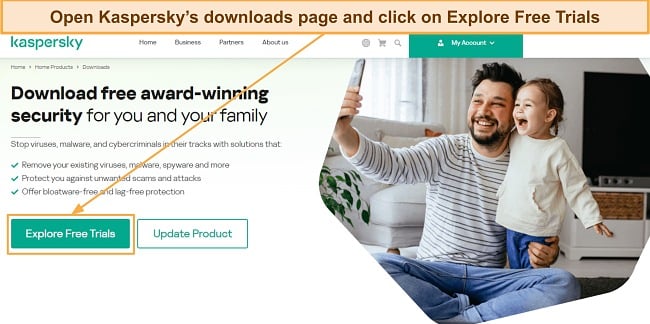
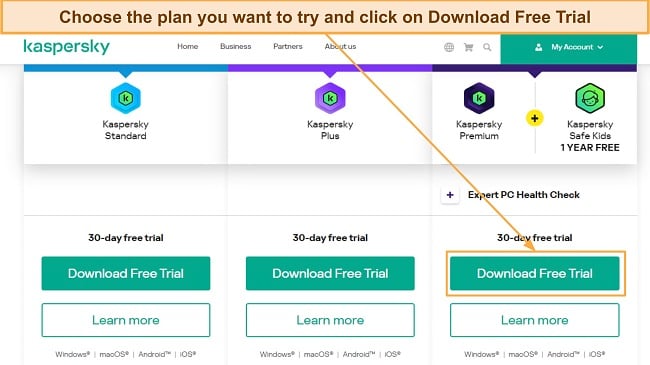
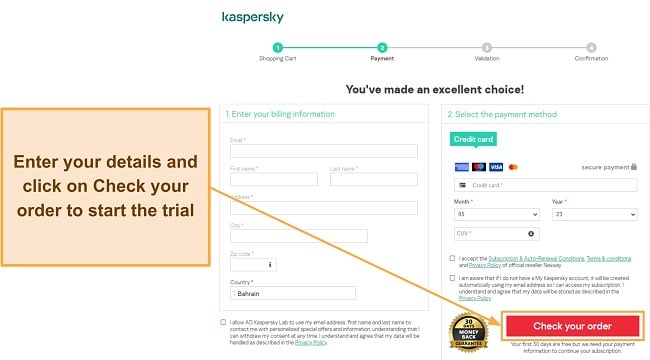
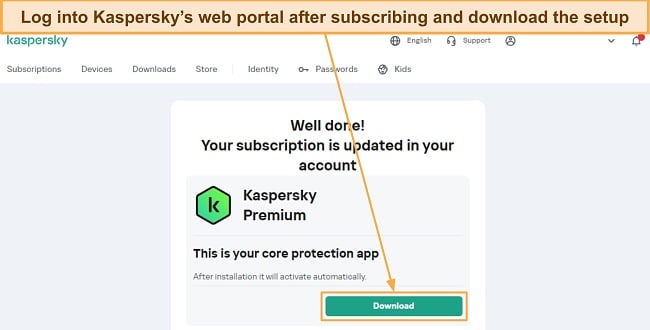
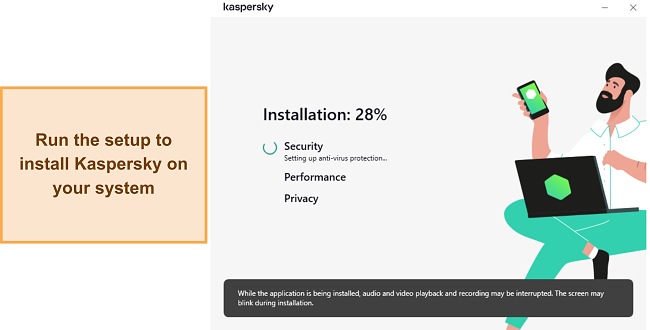
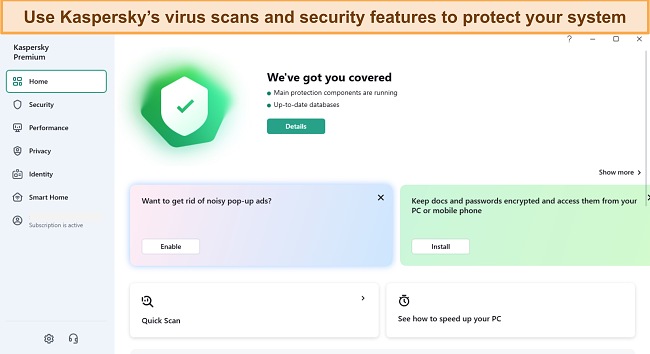



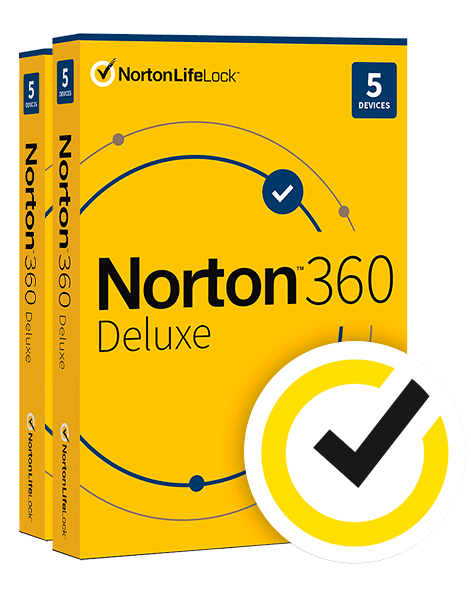
Leave a Comment
Cancel